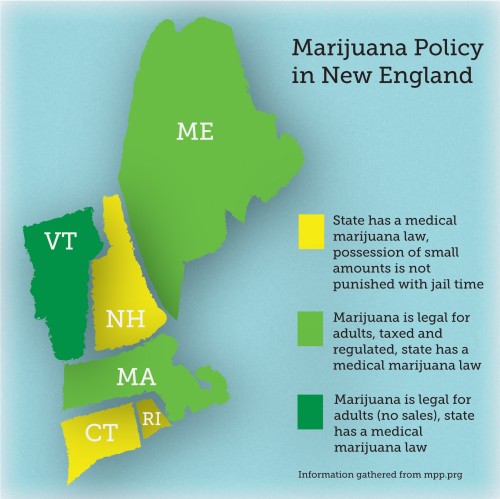The commission created last year by the Rhode Island General Assembly to study legalizing recreational cannabis has missed its reporting deadline of March 1, 2018, and a possible extension remains mired in disagreement between the two legislative chambers. Proponents want to regulate and tax cannabis for recreational purposes similarly to alcohol.
Although the study commission was created in June 2017 (H.5551/S.0277), its members were not appointed until late September and it did not hold its first meeting until late October. In mid-February, when it became clear the original March 1 reporting deadline would not be met, in typical RI political fashion the House and Senate each proposed their own extensions to different dates, the Senate (S.2418) to May 31, 2018, and the House (H.7529) to February 1, 2019. Upon passage of their inconsistent extensions, the chambers promptly referred them to each other’s Judiciary committees for reconciliation. At this point, the commission is in default of its original charge to report by March 1, which remains in effect until and unless the chambers can agree on a new deadline, and the commission would cease to exist entirely when its original operating authority expires on July 1. (The House proposal would also extend operating authority to May 1, 2019.) As a practical matter, missing the reporting deadline is a much less serious matter because a late report would certainly be accepted, but allowing operating authority to expire would strip legal ability to consider, adopt or submit the report at all.
For eight years, the Rhode Island General Assembly – the state’s part-time (January through more-or-less June) legislature – has had bills introduced to legalize recreational use of cannabis. For the first six of those years, nothing happened as the bills were unceremoniously allowed to die in committee without even reaching the floor of either the House or Senate for a vote.
 Finally, in 2017 – year seven for the RI bills – legalization in neighboring Massachusetts and in Maine as of November 2016 made the issue impossible to ignore, as I predicted three years ago would happen (Opinion: Will Rhode Island Surrender Yet Another Industry?”, Jun 4 2015). Vermont became the third of the six New England states to legalize in January 2018. Rather than allow the 2017 RI bills to just die, a 19-member study commission was created (“News Analysis: RI to Study, not Legalize, Cannabis”, Sep 6, 2017) with the expectation that the March 1, 2018, reporting deadline would provide adequate time for action before the 2018 legislative session ends in June, although as the clock ticks down months past that deadline, it is increasingly difficult to see how there would be time to get anything done this year.
Finally, in 2017 – year seven for the RI bills – legalization in neighboring Massachusetts and in Maine as of November 2016 made the issue impossible to ignore, as I predicted three years ago would happen (Opinion: Will Rhode Island Surrender Yet Another Industry?”, Jun 4 2015). Vermont became the third of the six New England states to legalize in January 2018. Rather than allow the 2017 RI bills to just die, a 19-member study commission was created (“News Analysis: RI to Study, not Legalize, Cannabis”, Sep 6, 2017) with the expectation that the March 1, 2018, reporting deadline would provide adequate time for action before the 2018 legislative session ends in June, although as the clock ticks down months past that deadline, it is increasingly difficult to see how there would be time to get anything done this year.
The 19 members – three from the Senate, three from the House and 13 from government agencies and community stakeholders defined in the enabling resolution – are:
- Senate: Sen. Cynthia Coyne (D-32), Sen. Joshua Miller (D-28), and Sen. Nicholas Kettle (R-21 – see explanation below)
- House: Sen. Dennis Canario (D-71), Sen. Arthur Corvese (D-55) and Sen. Anthony Giarrusso (R-30)
- Smart Approaches to Marijuana (appointed by House): Nancy DeNuccio
- President of Substance Use Mental Health Council of RI: Dr. David Savitzky
- Proponent for legalization (appointed by Senate): Michael Beauregard, president of Young Democrats of RI
- Executive Director of RI Medical Society or designee: Steve DeToy, director of government and public affairs (designee)
- Local chamber of commerce (appointed by Senate): Laurie White, president of Greater Providence Chamber of Commerce
- Director of RI Department of Health or designee: Dr. Nicole Alexander-Scott
- President of RI Police Chiefs Association or designee: Dean Hoxsie, president
- Attorney General or designee: Joee Lindback, assistant attorney general (designee)
- Medical marijuana patient (appointed by Senate): Julie Lancia
- Educator (appointed by House): Carol Formica, Middletown Substance Abuse Coalition
- Mental health professional (appointed by House): Mike Cerullo
- Criminal defense attorney (joint appointment of House and Senate): John MacDonald
- President of AFL-CIO or designee: Tim Melia, president of Local 328 United Food and Commercial Workers (designee)
We were unable to determine who, if anyone, occupies Kettle’s seat on the commission after he was forced to resign from the Senate in February under threat of expulsion in consequence of a grand jury indictment on charges of video voyeurism and two counts of extorting a male Senate page who was 16 or 17 at the time to twice have sex in 2011.
The commission has only filed a single agenda on its official web page, for its initial meeting on October 25, 2017, when it elected co-chairs and conducted no other significant business. Normally, government agencies are required to publish agendas and minutes under the Open Meetings Act, but the legislature exempts itself and its commissions from these requirements; the Office of the Attorney General, which has enforcement responsibility for the Open Meetings Act, declined to offer an opinion whether the commission was covered under it and referred my inquiry to the legislature.
The study commission was called a delaying tactic by legalization proponents, including in a May 2017 joint opinion article in The Providence Journal by Miller, the lead sponsor of legalization in the Senate, and Rep. Scott Slater (D-10), the lead sponsor of legalization in the House. In an interview in September, Slater told me that he saw the study commission as so pointless that he declined an invitation to participate. Miller took the opposite view and now serves as the commission co-chair from the Senate.
The co-chair from the House, Canario, was the lead sponsor of the bill creating the study commission, and is generally regarded as opposed to legalization, as is Coyne, who was the lead sponsor of the bill in the Senate creating the study commission. Canario is a retired Portsmouth police officer and Coyne retired from the RI State Police at the rank of lieutenant.
Although the enabling legislation for the study commission is written to be even-handed in theory, assigning specific seats to one proponent (Beauregard) and one opponent (DeNuccio) of legalization, in practice many of the appointees representing a particular constituency are otherwise vocal opponents, including the attorney general and the RI Police Chiefs Association.
Cerullo, appointed to represent mental health professionals, is a leader of What’s the Rush, RI?, whose website claims dozens of negative physical and mental effects from cannabis. He was embarrassed when PolitiFact rated as “mostly false” his claim in a 2014 commentary in The Providence Journal that “marijuana contains 50 to 70% more carcinogenic hydrocarbons than tobacco.”
Formica, appointed to represent educators, has for years published in The Providence Journal numerous letters and columns unambiguously opposed to legalization, writing “research has shown that marijuana use has been linked to unemployment and social welfare dependence, as well as mental illness and addiction” (“Carol Formica: Politicians would hurt our children for dollars”, Mar 6, 2014), “At what price are we willing to risk our children’s future?” (“Carol Formica: Don’t sell out our children for pot dollars”, Apr 13, 2014), and citing with approval “[Roman Catholic Diocese of Providence] Bishop Thomas Tobin is quoted as saying, ‘In opening the door to drug use even a little bit, we have so much to lose and absolutely nothing to gain.’ Amen.” (“Carol Formica: Tobin right about marijuana dangers”, May 13, 2016).
More recently, Formica cited a case of a “dismembered body as part of a crime involving legal marijuana” (“Carol Formica: Beyond the spin, problems with marijuana”, Jan 19, 2017), referencing the 2015 murder of Kerry Mello, the same case we reported Hopkinton Police Chief David Palmer suggesting in testimony at a House committee would be a harbinger of increased murders and dismemberments if cannabis were legalized, prompting an incredulous Rep. Jeremiah O’Grady (D-46) to ask, “Is it not fair to say that… If cannabis were sold legally, the number of marijuana dealers being dismembered by either patrons or rivals would decrease?” (“Cannabis Legalization in RI: Where’s Our Law?”, Apr 19, 2017). But Formica grossly misrepresented the facts of that case, as reported in depth by Amanda Milkovits of The Providence Journal (“In R.I., 4 men and a drug trade murder: Criminal histories and a failed redemption”, May 2, 2016): state police said that defendant Jamie Barriera believed Mello had stolen 30 pounds of cannabis and cash worth about $70,000, and that both men had substantial criminal histories involving cocaine trafficking. Although Barriera had a state medical permit as a caregiver, Formica’s claim that such a large quantity hugely exceeding medical limits could be “legal marijuana” is obviously absurd.
As the study commission studies, Governor Gina Raimondo has proposed a budget that expects an increase of $5.1 million in tax revenue from medical marijuana, primarily by quintupling the number of dispensaries from three to 15 and decreasing the number of plants grown by patients from 12 to eight. This is consistent with my speculation two years ago that the real goal of state policy was to squeeze out individual growing by patients and caregivers and forcibly migrate them to the compassion center model (“News Analysis: Taxing Medical Marijuana”, Feb 17, 2016).
As I warned three years ago, Massachusetts border towns such as Attleboro – 10 minutes away from the RI State House along I-95 – are gleefully anticipating tax revenues expected to be around 20% of gross sales from the imminent opening of retail cannabis businesses, ranging from shops analogous to liquor stores and cafes analogous to bars, beginning July 1. While logistical and other concerns will likely push actual operations out a few months, it would be pure stupidity to deny that much of their sales will be to cannabis tourists crossing the state line from RI.
As regulated and taxed retail cannabis businesses open just across the state line, RI cannot even manage to get its study commission to write a report by the original deadline over a month ago nor even to agree on a new deadline. How much money is RI leaving on the table?
Every state official called for comment could not be reached and did not return calls by press time, including House Speaker Nicholas Mattiello (D-15) and Senate President Dominick J. Ruggerio (D-4) who are jointly the appointing authorities for the study commission, and commission co-chairs Miller and Canario.

